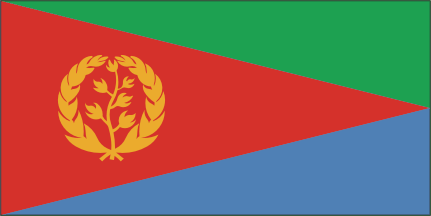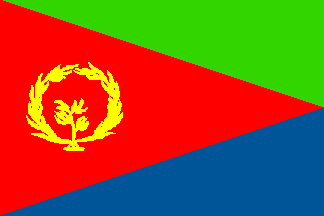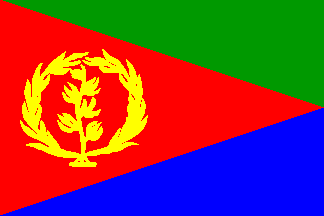
![[National flag and ensign]](../misc/oooooo.gif) 1:2 Image by
Ruth Tedler, 07 June 2017
1:2 Image by
Ruth Tedler, 07 June 2017Flag adopted 05 December 1995: Coat of Arms adopted 24 May 1993.

Last modified: 2023-12-09 by bruce berry
Keywords: eritrea | africa | wreath | afars |
Links: FOTW homepage |
search |
disclaimer and copyright |
write us |
mirrors

![[National flag and ensign]](../misc/oooooo.gif) 1:2 Image by
Ruth Tedler, 07 June 2017
1:2 Image by
Ruth Tedler, 07 June 2017
Flag adopted 05 December 1995: Coat of Arms adopted 24 May 1993.
See also:
The history of the country is closely tied to its strategic location on the Red Sea, across which came the initial colonisers from modern day Yemen as well as the Ottoman Turks, Portuguese, British and in the 19th century, the Italians. Following the opening of the Suez Canal in 1869, Italy invaded Ethiopia and occupied Eritrea. On 01 January 1890, Eritrea officially became a colony of Italy and in 1936 it became a province of Italian East Africa (Africa Orientale Italiana) along with Ethiopia and Italian Somaliland. During World War II the British expelled the Italians following the Battle of Keren in 1941 and took over administration of the country. After World War II, the British continued to administer the territory under a United Nations (UN) mandate until 1951, when Eritrea was federated with Ethiopia as per United Nations Resolution 390A(V). Eritrea became Ethiopia's 14th province in 1952.
The resistance to the annexation of
Eritrea by Ethiopia resulted in a struggle for independence being waged by the
Eritrean Liberation Front (ELF) from September 1961 until May 1991 when the
Eritrean People's Liberation Front (EPLF) defeated the
Ethiopian forces and took control of the country. The fall of the Mengistu
regime in Ethiopia in May 1991 was followed by a constitutional conference at
which the EPLF negotiated an agreement with the new transitional government of
Ethiopia to allow for a referendum to be held on the issue of independence for
Eritrea. The result of the referendum held in April 1993 was almost
unanimously in favour of independence which was formally granted on 24 May 1993.
Bruce Berry, 01 Sept 2011
The national flag of Eritrea comprises two triangles of green over blue
in the fly with red triangle at hoist reaching the fly,
and with yellow wreath in the centre of the red triangle.
The construction sheet in Album des Pavillons (2000) [pay00] positions the midpoint of the wreath 1/2 hoist from hoist.
There is also a problem with overall ratio. Previously on FOTW, and on the World Flag Database site and in
Album des Pavillons (1995) [pie95], the ratio is given as 2:3, while in
Album des Pavillons (2000) [pay00] (and
the corrections to the 1995 edition [pay96] as well as on the
Shipmate Flag Chart (2000) [vdv00] it is
given as 1:2. Presumably the latter data would be more correct.
 Image
by BlinxCat, 24 Nov 2021
Image
by BlinxCat, 24 Nov 2021
Some earlier variants have a
smaller wreath and plant in the fly as shown above.
Pantone approximations given in Album des Pavillons (2000) [pay00] are:
| green | 361c
| red | 185c
| yellow | 123c
| blue | 279c
Even if there seems to be no direct connection with green and blue flag in neighbouring countries and regions, certainly the light blue - green combination is popular in this
part of the world.
Željko Heimer, 01 Aug 2001
 2:3
Image
by Mark Sensen, 03 Aug 2001
2:3
Image
by Mark Sensen, 03 Aug 2001
This flag is a combination of the Liberation Army flag (similar to the current one, only with a gold star in the hoist) and the Eritrean flag in use in 1950's. In use since 1993.
David Kendall, 01 Dec 1996
In my opinion, the colours used by Eritrea don't have any relation with
those used by neighbouring countries. Djibouti
(Afars and Issa Somali) have blue to represent the Issas and green-white-blue for
the Afars while Sudan uses the Pan Arab colours and
Ethiopia uses the Pan African colours.
I believe that the colours came from the blue and green in the flag of
autonomous Eritrea (designed in
1952 but from proposals dating back to 1950) with the red added for socialism.
The Eritrean People's Liberation Front (EPLF) was not a wing of ELF but an
opposing movement. ELF was more moderate and supported by moderate countries
while the EPLF was
supported by former Eastern Bloc (Soviet Union) until Haile Mariam took power in Ethiopia
and the alliances were reversed. The EPLF chose red as their colour. On
their flag a red arrow symbolised that the socialist revolution would penetrate in Eritrea
(symbolised the green and blue of its flag.
The star is for the country and to guide the revolution.
Jaume Ollé, 01 Aug 2001
Concerning the branches on the Eritrean flag : the two outer branches are evidently
olive (UN - Eritrea in 1950s - Eritrea 1993), but what is the central
branch with the forked leaves?
Firstly there was proposed a single olive branch, but the final agreement was a central olive branch with two
surrounding branches. Since adoption the emblem was slightly changed, something which is not very well documented, so it may not still be considered an olive branch.
Jaume Ollé, 02 Aug 2001
The protocol manual for the London 2012 Olympics
(Flags and Anthems Manual, London, 2012 [loc12])
provides recommendations for national flag designs. Each National Olympic
Committee was sent an image of their flag, including the PMS shades, by the
London Organising Committee of the Olympic Games (LOCOG) for their approval.
Once this was obtained, the LOCOG produced a 60 x 90 cm version of the flag for
further approval. So, while these specifications may not be the official,
government, version of each flag, they are certainly what the National Olympic
Committee believed their flag to be.
For Eritrea : PMS 361 green, 185 red, 279 blue, 123 yellow. The vertical flag is
simply the horizontal version turned 90 degrees clockwise.
Ian Sumner,
10 Oct 2012
According to the Swiss Federal Department of Foreign Affairs (Traveler's Guide), extreme respect must be shown to the Eritrean national flag:
"Cultural specificities: The national flag is subjected to a great respect. During the hoisting of the flag, car drivers must park and get out of their vehicle, whereas pedestrians must stop."Source: http://www.eda.admin.ch/eda/f/tool/cont_travad/eritr.html
In Identifying Flags, Eve Devereux (1998)
[dev98] writes:
"Green symbolizes the agricultural and livestock economy of the country,
red the bloodshed in the struggle for independence, blue the marine wealth,
and yellow the mineral wealth of Eritrea". Album des Pavillons (2000) [pay00]. No mention is made of the meaning of
the olive wreath with an upright branch, which I presume symbolizes peace.
Jarig Bakker, 05 Aug 2002
I have read that the olive wreath on Eritrea's flag symbolizes the UN
and its role in helping with that country's independence.
Nathan Lamm, 05 Aug 2002